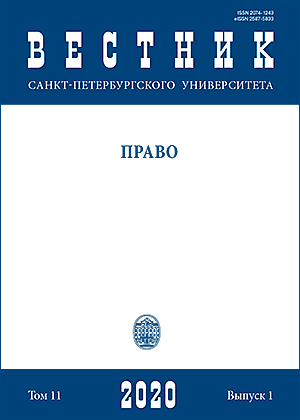Concept of the development of the Russian penitentiary system in light of interpreted principles of European penitentiary practice
DOI:
https://doi.org/10.21638/spbu14.2020.109Abstract
In the article, based on the study of the European experience in the execution of criminal penalties, it is proposed to supplement the national criminal-penal policy with a number of principles, among which, in particular, are mutual consideration of the interests of the individual, society and the state; the expediency which excludes the priority of legal conformity in the process of using foreign penitentiary experience; coherence which allows for avoiding contradictions between national and international law in terms of social and economic possibilities for the implementation of humanitarian standards. The concept of the development of the penitentiary system of the Russian Federation until 2020 is analyzed and criticized from the perspective of these principles. It is shown that the growing trend of complaints from those convicted to the European Court of Human Rights, related to the fact that the established regime requirements violate a number of constitutional rights of these persons and the provisions of The European Convention for the Protection of Human Rights and Fundamental Freedoms 1950, is not taken into account. It is substantiated that a revision of the domestic conceptual foundations of the regime is required, which continues to express primarily the punitive claims of the state to the convicted person. It is stated that the provisions of the European Prison Rules for various reasons are not fully implemented in Western prison systems and therefore should be extremely carefully interpreted in the legislative structures of Russian penal law. It is concluded that it is possible to take into account the criticisms set forth in the article when developing the Concept for the modernization of the penitentiary system (2021–2030).
Keywords:
European law, foreign experience, correctional institution, international standards, penitentiary ideology, law enforcement practice, remedies, conditions of detention
Downloads
References
Downloads
Published
How to Cite
Issue
Section
License
Articles of "Vestnik of Saint Petersburg University. Law" are open access distributed under the terms of the License Agreement with Saint Petersburg State University, which permits to the authors unrestricted distribution and self-archiving free of charge.






